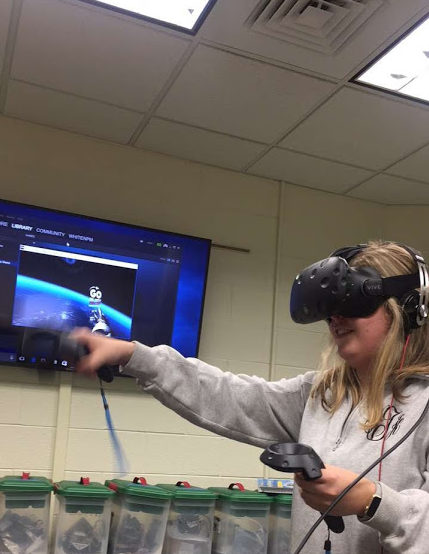Virtual Reality goggles, a TJBot and a Raspberry Pi workshop room were just three of the features found at Wake Hacks Zero, the first official hackathon hosted on Wake Forest’s campus, on Saturday, April 8.
Computer science students of all skill levels teamed up to create projects entirely from scratch-to-finish, ranging from coding tic-tac-toe games and sudoku games to programming miniature robots. While typical hackathons usually last at least 24 hours, this event spanned just seven hours, as it was designed to be a mini trial run in preparation for the university to host a full-scale hackathon in the spring of 2018.
Despite the time constraint, many of the teams made significant progress towards their goals, some even completing entire projects.
“What I did and what other groups were able to do in seven hours was more than you might expect of groups after full-scale hackathons,” said senior Travis Palmer. “The fact that everyone was able to produce something meaningful by the end of our shorter one was great.”
Palmer used his time at the hackathon to build a web crawler which identifies school district websites that have security concerns regarding the protection of individual student data, including passwords. He initially read about the problem in an online newspaper and has since taken it upon himself to notify districts whose websites are at-risk for hackers and other malware problems.
He started by manually identifying and notifying his own home school district of the problem, a task he can now more easily continue with the use of his web crawler.
“Hacking their site would have been trivially easy for almost anyone who was ‘in the know’ — so I notified them,” Palmer said of his own district’s website. “They ended up shutting down the entire district’s network to patch it in the middle of the day and delete all the old student accounts on my suggestion.”
The first place team, composed of senior visiting student Alina Pacheco and graduate students Melisa Carranza and Sebastian Ramirez, used the time to create a more friendly programming interface for TJBot, a do-it-yourself cardboard robot produced by IBM.
They take their TJBot to Speas Elementary School on a regular basis to promote computer science interest in younger students.
“The students were excited about TJBot but it’s not as straightforward as it could be, so we wanted to come up with an interface that would make it easier for the kids there to gain notions of coding and programming,” Carranza said. “Ideally, we want them all to be able to work on multiple computers and one robot, since they all don’t have individual robots.”
Pete Santago, chair of the department of computer science, was impressed by many of the projects that students worked on.
Duke and the University of North Carolina at Chapel Hill both host regular, full-scale hackathons each fall and the idea of Wake Forest hosting its own has been bounced around for years.
“These events, especially student-driven events, show the world what it means to be at Wake Forest — that students not only learn, but are excited about their education” Santiago said. “In turn, we continue to attract more great students — like the ones we have now.”
Next year’s full-scale hackathon will invite students from other universities and may make use of space in the Innovation Quarter, as compared to this year’s event, which was hosted in the basement of Manchester and was only open to Wake Forest students.
“What I find most significant is the enthusiasm, excitement and leadership that the students exhibited,” Santago said. “This is what builds and sustains our computer science family. This is why I am in this job — to see young people learn and grow. What we get, moving forward, is energy from students that builds on itself. I find myself with new energy, ideas and enthusiasm whenever students are involved.”
The hackathon was officially hosted by the Association for Computer Machinery Club and was sponsored in large part by Inmar, a local technology and data science company in Winston-Salem.
Sophomore Nick Gerace and junior Sajant Anand played large roles in planning the event, coordinating between professors and students to ensure that participants had access to all the supplies they might need to achieve their project goals.
“Hackathons are about the experience, not the projects,” Gerace said. “Many just go to the event to play with the equipment that sponsors provide and to see what other students can do. Our Demon Deacons are some of the most well-rounded students on the planet. We have the potential to dominate computer science and tech programs going forward.”













